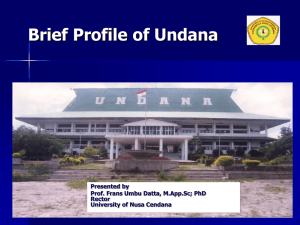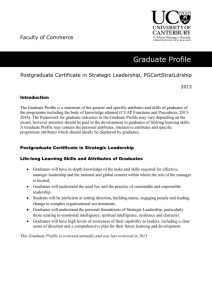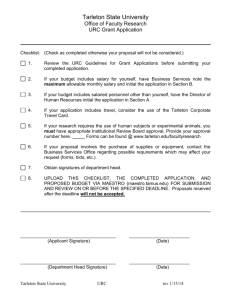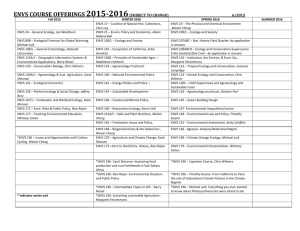THECB New Academic Program Approval and Review
advertisement
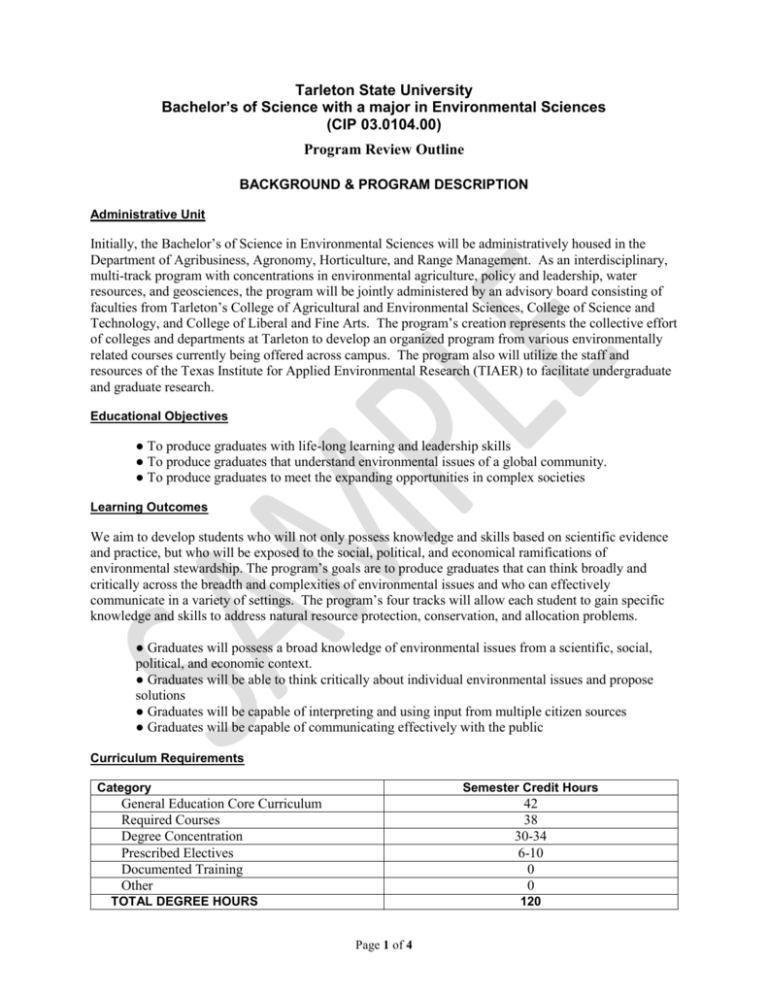
Tarleton State University Bachelor’s of Science with a major in Environmental Sciences (CIP 03.0104.00) Program Review Outline BACKGROUND & PROGRAM DESCRIPTION Administrative Unit Initially, the Bachelor’s of Science in Environmental Sciences will be administratively housed in the Department of Agribusiness, Agronomy, Horticulture, and Range Management. As an interdisciplinary, multi-track program with concentrations in environmental agriculture, policy and leadership, water resources, and geosciences, the program will be jointly administered by an advisory board consisting of faculties from Tarleton’s College of Agricultural and Environmental Sciences, College of Science and Technology, and College of Liberal and Fine Arts. The program’s creation represents the collective effort of colleges and departments at Tarleton to develop an organized program from various environmentally related courses currently being offered across campus. The program also will utilize the staff and resources of the Texas Institute for Applied Environmental Research (TIAER) to facilitate undergraduate and graduate research. Educational Objectives ● To produce graduates with life-long learning and leadership skills ● To produce graduates that understand environmental issues of a global community. ● To produce graduates to meet the expanding opportunities in complex societies Learning Outcomes We aim to develop students who will not only possess knowledge and skills based on scientific evidence and practice, but who will be exposed to the social, political, and economical ramifications of environmental stewardship. The program’s goals are to produce graduates that can think broadly and critically across the breadth and complexities of environmental issues and who can effectively communicate in a variety of settings. The program’s four tracks will allow each student to gain specific knowledge and skills to address natural resource protection, conservation, and allocation problems. ● Graduates will possess a broad knowledge of environmental issues from a scientific, social, political, and economic context. ● Graduates will be able to think critically about individual environmental issues and propose solutions ● Graduates will be capable of interpreting and using input from multiple citizen sources ● Graduates will be capable of communicating effectively with the public Curriculum Requirements Category Semester Credit Hours General Education Core Curriculum Required Courses Degree Concentration Prescribed Electives Documented Training Other 42 38 30-34 6-10 0 0 TOTAL DEGREE HOURS 120 Page 1 of 4 Outcomes Assessment The program shall utilize both formative and summative protocols to assess the achievement of student learning outcomes. Specific learning outcomes identified for each course in the curriculum will provide the basis for formative assessment, while summative assessment will take place in a common setting. All students will enroll in ENVS 101 and ENVS 485 to allow for assessment across program concentrations. Implementation Date The proposed implementation date will be January 1, 2011. NEED Employment Opportunities Environmental jobs exist under the broad classes of advocacy, activism, conservation, or regulation. These jobs occur broadly across numerous sectors, making opportunities less susceptible to fluctuation and providing graduates with career stability. However, specific positions may fall under many job titles. Positions that once simply sought a “conservationist” are now placed under a variety of “new” headings. Conservationists are now restoration ecologists, agroecologists, reclamation assistants, or regulatory technicians. Energy exploration and development, water and wastewater management, green energy, and green industries continue to expand the need for environmental science graduates. Governments, as well as those private enterprises that serve governments, are the primary employers. There is additional need for students trained in environmental issues to meet the challenges of global resource conservation and stewardship and to assist with international sustainable development. An internet search produced a multitude of employment opportunities from websites such as ecojobs.com, ejobs.org, ecoemploy.com, environmentaljobs.com, or environmentalcareers.com. One website posted 4,184 positions as of 3/4/2010. Projected Enrollment Enrollment should reach 124 by year 5 of the program. Initial enrollments will come primarily from the current residential headcount as students migrate in from other majors or transfer from community colleges in the region. A comprehensive recruitment program will be initiated in year 2 to attract students from surrounding counties and the Fort Worth-Dallas metropolitan area. Existing State Programs A review of existing programs in Texas with an “environmental” or related title produced 16 programs, 8 private and 8 public. Of these, only one private program was truly interdisciplinary with multiple tracks and only one other appeared to interdisciplinary in nature. Most are housed within a single department, the majority within biology or agricultural departments. Only one indicated that it was a BS in Environmental Science. Other organizational arrangements included programs housed in departments of natural or physical sciences, geology or geosciences, or geography. Abilene Christian University offers a BS – Environmental Science degree with four areas of concentration. Stephen F. Austin State University offers a BS – Environmental Science degree with two emphasis areas. QUALITY & RESOURCES Faculties The College of Agriculture and Environmental Sciences will assigned two faculty core roles and three will serve in supporting roles. Expertise represented includes restoration ecology, soil science, Page 2 of 4 agricultural economics, and watershed management. The College of Science and Technology will assign three core and three supporting faculties. Expertise represented by this group includes hydrology, geology, biology, and chemistry. The College of Liberal and Fine Arts will provide two core and one supporting faculty member representing political science, environmental law, and environmental sociology. Several other supporting faculties will come from the College of Business. Additional academic support will come from TIAER, which employs four staff members holding the PhD. It is estimated that two new faculty (50% time) will be needed to accommodate program growth by year 5. Program Administration The program curricula will jointly administered by an advisory board consisting of core faculties from each college. Operational oversight will be provided by the Department of Agribusiness, Agronomy, Horticulture, and Range Management (AAHRM). Other Personnel Clerical staffing support will be provided by departmental staff in COAES, COST, and TIAER. Graduate Assistants Each department has an allotted number of graduate teaching assistants to support laboratory instruction. Supplies, Materials Adequate supplies and materials are in place in contributing departments. Library The combined resources of monographs and journals in both the traditional and electronic collections of the Tarleton Libraries are sufficient to support the Bachelor of Science in Environmental Sciences. The Library subscribes to over 200 databases that provide access to electronic journals and other resources formerly available only in print. Environmental sciences resources are well represented throughout the library’s collection of databases. Some of the most relevant databases include Environment Complete, Science Direct, SpringerLink, JSTOR, InformaWorld, WileyInterscience, and ProQuest Agricola. Equipment, Facilities The two principal colleges, COAES and COST, currently possess the equipment and facilities resources to support the program. Equipment is in place for a full spectrum of physical, chemical, and biological sampling and analyses. Available through TIAER is a NELA certified laboratory for water, soil, and sediment analysis. Clinical/Internship Sites A variety of internship opportunities will be available to program students; USDA, TCEQ, private engineering or environmental consulting firms, etc., (http://www.tarleton.edu/geoscience/faq.html). Typically, anywhere from 8 to 16 students from relevant programs in COAES and 2 to 6 students in COST complete an internship each year. We will explore other opportunities for students in the policy and leadership concentration during year 1. Accreditation This program will not seek national accreditation. Page 3 of 4 Educator Certification Program This program does not include teacher certification components. COSTS & FUNDING SOURCES FIVE-YEAR COSTS Faculty New Reassign Program Administration Reassign Graduate Assistants New Reassign SOURCES OF FUNDING $120,000 Formula Income Year 3-5 900,000 190,800 $181,663 Other State Funding 58,000 58,000 Reallocation Supplies & Materials Federal Funding Library & IT Resources Other Funding desig tuit/fee 1,188,800 732,096 Equipment, Facilities Other Reassign-clerical Estimated 5-Year Costs 40,000 Estimated 5-year Revenues $ 1,366,800 $2,102,559 The Chief Executive Officer of the institution has certified that the institution will have funds sufficient to support the proposed program. Tarleton State University is committing more than 50 percent of the funds from existing fund sources towards the projected costs over the first five years. Estimated formula funding generated in years three through five of the proposed program would total $181,688. ********** Page 4 of 4




